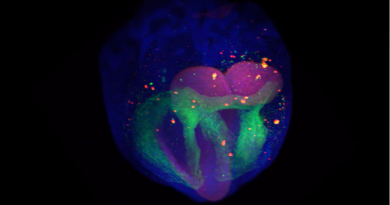Friend and foe: Histamine mediates allergies and can fight colorectal cancer
Previous studies have shown that histamine is not only involved in allergic disease, it also may have a potential antitumor effect. At Baylor College of Medicine, the lab of Dr. James Versalovic, Milton J. Finegold Professor of pathology and immunology and pathologist-in-chief at Texas Children’s Hospital investigated whether the probiotic Lactobacillus reuteri 6475, which is able to generate histamine, had the ability to reduce the frequency and severity of inflammation-associated colorectal cancer in mice that were not able to produce histamine on their own.

“We are on the cusp of harnessing advances in microbiome science – the study of the microbes living in our body – that would facilitate diagnosis and treatment of human disease,” Versalovic said. “By simply applying diet-based cancer prevention strategies, such as supplementing microbes that provide missing life substances, we can potentially reduce the risk of cancer.”

The researchers conducted a series of experiments with mice that were deficient in histidine decarboxylase, the enzyme required to convert L-histidine to histamine. Experimental mice received L. reuteri 6475, which has the gene for histidine decarboxylase to produce histamine. Control animals received L. reuteri that lacked the gene to produce the enzyme. The probiotic was administered both before and after the mice received a single treatment to induce tumor formation. Fifteen weeks later, the mice were sacrificed and the tissues removed for study.
The animals treated with L. reuteri 6475 showed increased expression of bacterial histidine decarboxylase enzyme and of the amount of histamine in their colons.
Positron emission tomography (PET) used to visualize the tumors showed that these mice had fewer and smaller tumors than control mice. L reuteri strains deficient in histidine decarboxylase activity did not provide protective effects; the mice showed increased numbers of ‘hot spots’ indicative of tumor formation.
Treatment with the histamine-generating probiotic also reduced inflammatory responses typically associated with increased risk of tumor development. According to Versalovic, “These observations are consistent with the conclusion that histamine-generating probiotic L. reuteri may attenuate development of colorectal cancer in the animal model, at least in part, via reduction of a pro-cancer inflammatory response.”
The role of histamine in human cancer is still unclear. However, when investigators analyzed data obtained from 2,113 colorectal cancer patient samples taken from 15 datasets, results showed better survival in patients with elevated patterns of histidine decarboxylase. These findings indicate that histamine-generating probiotics, in the presence of sufficient histamine precursor L-histidine, may improve outcomes for patients with sporadic- and bowel disease-associated colorectal cancer.
“Our results suggest a significant role for histamine in the suppression of chronic intestinal inflammation and colorectal tumorigenesis. We also have shown that cells, both microbial and mammalian, can share metabolites or chemical compounds that together can promote human health and prevent disease,” Versalovic said.
The complete study appeared in the American Journal of Pathology.
###
The following authors also contributed to this work, Chunxu Gao, Bhanu Priya Ganesh, Zhongcheng Shi, Rajesh Rasik Shah, Robert Fultz, Angela Major, Susan Venable, Mónica Lugo, Kathleen Hoch, Xiaowei Chen, Anthony Haag and Timothy C. Wang. The authors are affiliated with one or more of the following institutions Baylor College of Medicine, Texas Children’s Hospital and Columbia University.
This research was supported by the National Institutes of Health, including the National Institute of Diabetes, Digestive and Kidney Diseases (R01 DK065075), Texas Medical Center Digestive Disease Center (P30 DK56338), the National Cancer Institute (U01 CA170930) and unrestricted research support from BioGaia AB (Stockholm, Sweden).



